In my line of work (the complaining about pop culture on the internet line of work), you tend to take whatever diversity in media you can get. It means spending hours developing backstory theories to explain Scott McCall's Mexican heritage because Tyler Posey has Mexican heritage. It means a lot of deep thoughts about Rashida Jones' character on Parks and Recreation. It means constantly walking an internal balancing line where you wonder, "Am I reading too much into this?" It means being hyper-aware of any smidgeon of representation for women and people of color and other marginalized groups and spending so much time obsessing over these details that you can kind of start to lose perspective.
And it means eventually having to sit yourself down and admit that you honestly don't know if Bellamy Blake on The 100 is supposed to be Asian or not.
So here's the basic problem: as a lifelong proponent of letting the casting inform the character, I have been operating under the assumption that Bellamy Blake, like Bob Morley the actor who plays him, is half-European and half-Filipino. Recently, however, it has occurred to me that we don't actually know for sure if Bellamy Blake was intended to be an Asian-American character. We really don't know that for sure.
While we do meet his mother, Aurora Blake (Monique Ganderton*) in a flashback episode, we know nothing about his father, not even his name. And both Bellamy's mother and his sister, Octavia (Marie Avgeropoulos), are played by white actresses. So while it's technically still totally possible that Bellamy is supposed to be mixed race like his actor, it's also not confirmed by the show itself, and I'm starting to think that this really does matter.
This is Asian-American and Pacific Islander Heritage Month here in the USA, and already we've looked at the damaging effect of stereotypes that paint Asian-Americans as inherently "hardworking" and "submissive" by examining their subversion in Harold and Kumar Go To White Castle. This week, though, we're taking a different tack - I want to use Bellamy as a lens by which to talk about "invisible Asians" or "stealth Asians", as in situations where the actors are Asian-American but their characters are not. Fun, right?
Also, before any of you get worried here, we will be avoiding spoilers for the most recent season of The 100 - I don't even want to get into that mess more than we have to, so for now we're going to ignore it and look at the larger systemic problems. For now.
We here in America have a very screwed up and frankly baffling way of looking at race. We think of whiteness as the default and everything else as a deviation from that, right? So if someone is mixed race, with one white parent and one African-American parent, then we would think of the child as being African-American not white. Alternately, though, the Native American community has to contend with actual blood quantum laws that regulate the amount of Native heritage you must have in order to qualify as Native. And somewhere in between those two ends of the spectrum is the Asian-American community.
Look, I hope we all understand now that while race really isn't a thing biologically speaking, racism is absolutely definitely a thing in our society and world. So while genetically and physically there really is almost no difference between saying that Bellamy Blake is Asian and saying that Bellamy Blake is white, there remains a profound cultural difference between those two statements. The impact of a show where Bellamy Blake is Asian is very different from the impact of a show where Bellamy Blake is white.
For starters, Bellamy Blake as an openly Asian-American leading man would be a big pushback against the stereotypes that Asian-Americans frequently face in the media. He's the kind of manly, gruff badass that Asian men are so often told they can't be. Bellamy is a born military leader and strategist, but he's also politically powerful, seems to have been born to give epic speeches, and sexy as hell.
His moments of fear and doubt come not when he worries that he's not strong enough or that everyone will laugh at him but when he realizes that he has made the wrong choice or that he has been too hard and cold and violent.
In a culture that tells Asian-American men to be worker drones and to kiss goodbye any concept of being the sexually appealing and active leading man, Bellamy Blake would and could be a breath of fresh air. He's physically strong and imposing, the kind of guy that all the girls on the show swoon after (with good reason), and a fantastically complex figure who has to grapple with great moral questions and issues of life and death. While I don't always appreciate the way that his character is handled, I can confidently say that even with the bad mixed in an openly Asian-American Bellamy Blake would be a huge deal.
For starters, there aren't many mainstream shows right now with an Asian-American lead, let alone a relatively uneducated Asian-American young man in the center role as a military strategist. I mean, Bellamy's not exactly a doctor or restauranteur here, is he?
Then factor in that all of his relationships so far have been interracial ones, that his character has never been subject to racist comments about the size of his penis or his "virility" - sadly topics that still come up on television today because we're kind of awful sometimes - and you have the ingredients for some fantastic representation. So why am I not shouting from the rooftops about the value and importance of Bellamy Blake for Asian-American representation on TV?
Because I am genuinely and deeply worried that he's not.
Like I said above, American culture has a tendency to view race as an either/or proposition. So while we view any person with any amount of African-American heritage as being "black by association", we don't tend to view Asian-Americans the same way. A lot of Asian-American actors, particularly actors from mixed race backgrounds, find themselves slipping under the radar, forced to play characters who are one or the other.
I call these characters "stealth Asians" partly to be funny but also partly to remind myself that they exist. Characters like Blaine Anderson on Glee are nominally white but played by white-passing mixed race actors (in this case Darren Criss, who is part-Filipino), meaning that their characters exist in a liminal space that both is and is not representation of Asian-Americans.
Chloe Bennet of Agents of SHIELD has stated in interviews that she gained more success in the industry after changing her name from Chloe Wang to the more neutral Bennet. “Oh, the first audition I went on after I changed my name, I got booked. So that’s a pretty clear little snippet of how Hollywood works.” Granted, Bennet now represents a case of it working in her favor - her character, Skye/Daisy Johnson, was written to reflect Bennet's racial background and has one Chinese parent and one white American parent. But other cases don't work out as well.
Take, for instance, Keanu Reeves, an actor who most don't even realize is relatively proud of his Chinese and Native Hawaiian heritage. Reeves has spent most of his career, for better or worse, playing white roles and only occasionally allowed to represent his Asian side on screen. As an actor, he falls clearly into our conceptions of whiteness and is forced to live in that bubble.
The result of this is an emptiness or lack where we could have more complex representations of Asian-Americans, particularly Asian-Americans of mixed race. But because of our cultural obsession with race as an either/or proposition, those representations disappear. Chloe Wang becomes Chloe Bennet, Keanu Reeves plays white, Blaine Anderson's heritage is never addressed, and Bellamy Blake is white. Probably.
It's a form of marginalization and, frankly, one of the more insidious kinds. Rather than pushing back at stereotypes and years and years of bad representation, this invisibility problem sweeps it all away and whitewashes the whole situation. So while it's still entirely possible that Bellamy Blake is and was always intended to be a man of color with a Filipino father, that's not how it comes across.
Instead of Bellamy Blake the revolutionary representative of non-stereotypical Asian-American masculinity, we get a character whose race is never mentioned or addressed, whose only references to history or culture are white**, and who represents nothing more than himself.
And since we all know now The 100 has such a problematic time with representations of women and people of color, the lack of explicit representation here makes me nervous. It makes me suspicious. The only other prominent Asian-American characters on this show have been a woman who was killed off too soon and a teenage boy who remains the only one of the main characters to never have a romantic subplot. I'm saying it doesn't look good.
I think of this as cheating at diversity, frankly. It's like the show and showrunners are trying to get the social justice points for having a non-white male lead while also avoiding actually having to have a non-white male lead. And please understand that none of this blame falls on Bob Morley as far as I can tell - it's about the how The 100 and its writers and producers and marketing and directors have fallen into a trap of systemic invisibility. Bellamy Blake might be Asian-American, but until someone actually says that, I can't be sure.
Look. Clearly this issue is a lot bigger than my current beef with The 100 and the question of whether or not we're ever going to find out who Bellamy's dad is. Really what I'm getting at is this: stealth representation is not representation. Casting actors of color or mixed race actors and asking them to "play white" isn't diversity. It's cheating. It's not representation.
Yes, there's a lot of value to be had in casting non-white actors in colorblind roles, but there is also a crucial importance to casting non-white actors in roles meant for non-white characters. Even on a show as "post-racial" as The 100, there is still value and importance in representing cultures and racial backgrounds on screen without erasing them and hand-waving them away. That's all.
 |
| Now deep breaths while we take in that jawline. |
**As in, that adorable scene where a small, hopelessly nerdy Bellamy names his little sister after a Roman emperor's sister because that's totally a normal thing for a child to do.

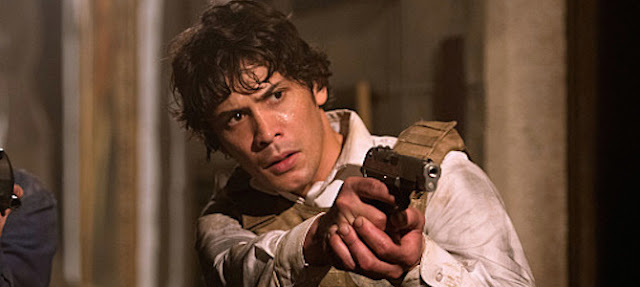
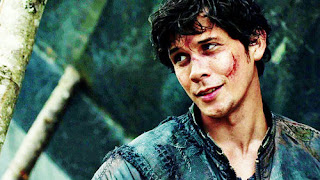
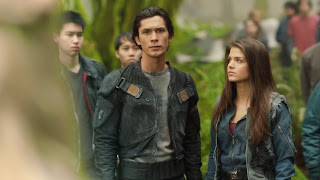
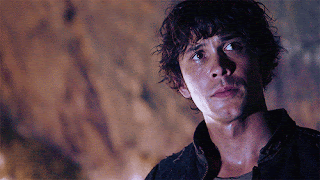
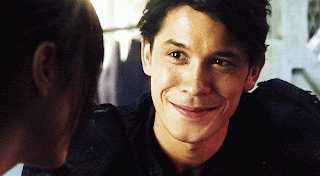

I just found your blog looking for Musketeers reviews and I love it. This article is very interesting. To me as a german sociology student it is always strange that Americans still use the term "race" so often. As you pointed out, race doesn't exist biologically, only socially. I never thought Bellamy was Asian becuase I didn't know he is half-Filipino. And Olivia is of greek ancestry, so I don't think he is supposed to be Asian. It is important to give Asian actors more diverse roles. But I don't think that just because an actor is half-Asian he or she should only play half-Asian characters. Like I don't think that a gay actor should only play gay characters. I think that should the choice of the actors only. Acting is playing a character, a role and not yourself.
ReplyDeleteWhat I minded more was the portrayal of Monty, he is such a stereotypical Asian man. His character changes a bit, but not so much.
What really disturbs me is the importance of the name and "race" to the casting directors. It shouldn't matter at all, where the actor's parents came from.
I just found your blog looking for Musketeers reviews and I love it. This article is very interesting. To me as a german sociology student it is always strange that Americans still use the term "race" so often. As you pointed out, race doesn't exist biologically, only socially. I never thought Bellamy was Asian becuase I didn't know he is half-Filipino. And Olivia is of greek ancestry, so I don't think he is supposed to be Asian. It is important to give Asian actors more diverse roles. But I don't think that just because an actor is half-Asian he or she should only play half-Asian characters. Like I don't think that a gay actor should only play gay characters. I think that should the choice of the actors only. Acting is playing a character, a role and not yourself.
ReplyDeleteWhat I minded more was the portrayal of Monty, he is such a stereotypical Asian man. His character changes a bit, but not so much.
What really disturbs me is the importance of the name and "race" to the casting directors. It shouldn't matter at all, where the actor's parents came from.
I'm curious as to why you haven't addressed the concept of half-siblings in this article. I find a lot of people rush to call Bellamy Blake a white character because his mother and sister are white, without considering that his father may not be. That was my first assumption when I watched the series - that he and Octavia were half-siblings (the distinction between sibling and half-sibling in a society without siblings would be, I imagine, a non-entity) both because he is mixed and she is not, and because his mother is not in any kind of committed relationship and is never implied to be.
ReplyDeleteThis comment has been removed by the author.
ReplyDeleteSo, by the same logic, every character on The 100 is white? Or we can't be sure they aren't white? No one ever calls Jaha or Wells or Pike or Indra black, no one calls Monty Asian, etc. None of the cultural references they use are anything but white.
ReplyDeleteAnd Lincolm and Anya are presumably white, right? Both actors are biracial, just like Bob Morley. No one ever calls Lincoln black. He doesn't have "black cultural references" and we never meet his parents. Ditto Anya - no one calls her Asian, we don't meet her parents, she has no "Asian cultural references".
Or...maybe we can employ basic logic and assume that a character who looks biracial and Southeast Asian/Austronesian - because the actor is half-Filipino - is biracial, just like we are (I think) assuming that Lincoln is biracial and black, for the same reason (as in, visual evidence)?
Harold Morley joined Global Rally Car Sales presenting his Porsche 996 GT3 for sale. Reconsales built and is currently on display Tuthill Porsche near Banbury in the UK. Its one fine piece of machinery.Harold Morley
ReplyDeleteThis comment has been removed by the author.
ReplyDeletekolkata hotel escorts
ReplyDeletekolkata call girls services
near by call girl
kolkata bengali escorts
kolkata housewife escorts
housewife escorts in kolkata
park street escorts
park street call girls
park treet near escort girls
ESCORT
ReplyDeleteESCORTS
FEMALE ESCORTS SERVICE KOLKATA
KOLKATA FEMALE ESCORTS SERVICE
INDEPENDENT ESCORTS SERVICE
INDEPENDENT ESCOTRTS SERVIC KOLKATA
KOLKATA INDEPENDET ESCORTS SERVICE
RUSSIAN ESCORTS SERVICE KOLKATA
RUSSIAN ESCORTS SERVICE
KOLKATA RUSSIAN ESCORTS SERVICE
FOREIGN ESCORTS SERVICE IN KOLKATA
INDEPENDEN FOREIGN ESCORTS SERVICE
ESCORT FOREIGN SERVICE IN KOLKATA
SEXY FEMALE ESCORTS SERVICE
SEXY MODEL ESCORTS SERVICE
MODEL ESCORTS CALL GIRLS
MODEL ESCORTS CALL GIRLS SERVICE KOLKATA
CALL GIRLS SERVICE KOLKATA
CALL GIRLS IN KOLKATA
KOLKATA CALL GIRLS
KOLKATA CALL GIRLS
CALL GIRLS KOLKATA
CALLL GIRL kolkata